#challenging growth
Explore tagged Tumblr posts
Text
What is “creative nonfiction,” exactly? Isn’t the term an oxymoron? Creative writers—playwrights, poets, novelists—are people who make stuff up. Which means that the basic definition of “nonfiction writer” is a writer who doesn’t make stuff up, or is not supposed to make stuff up. If nonfiction writers are “creative” in the sense that poets and novelists are creative, if what they write is partly make-believe, are they still writing nonfiction?
Biographers and historians sometimes adopt a narrative style intended to make their books read more like novels. Maybe that’s what people mean by “creative nonfiction”? Here are the opening sentences of a best-selling, Pulitzer Prize-winning biography of John Adams published a couple of decades ago:
This does read like a novel. Is it nonfiction? The only source the author cites for this paragraph verifies the statement “weeks of severe cold.” Presumably, the “Christmas storm” has a source, too, perhaps in newspapers of the time (1776). The rest—the light, the exact depth of frozen ground, the packed ice, the ruts, the riders’ mindfulness, the walking horses—seems to have been extrapolated in order to unfold a dramatic scene, evoke a mental picture. There is also the novelistic device of delaying the identification of the characters. It isn’t until the third paragraph that we learn that one of the horsemen is none other than John Adams! It’s all perfectly plausible, but much of it is imagined. Is being “creative” simply a license to embellish? Is there a point beyond which inference becomes fantasy?
One definition of “creative nonfiction,” often used to define the New Journalism of the nineteen-sixties and seventies, is “journalism that uses the techniques of fiction.” But the techniques of fiction are just the techniques of writing. You can use dialogue and a first-person voice and description and even speculation in a nonfiction work, and, as long as it’s all fact-based and not make-believe, it’s nonfiction.
The term “creative nonfiction” is actually a fairly recent coinage, postdating the advent of the New Journalism by about twenty years. The man credited with it is the writer Lee Gutkind. He seems to have first used “creative nonfiction,” in print, anyway, thirty years ago, though he thought that the term originated in the fellowship application form used by the National Endowment for the Arts. The word “creative,” he explained, refers to “the unique and subjective focus, concept, context and point of view in which the information is presented and defined, which may be partially obtained through the writer’s own voice, as in a personal essay.”
But, again, this seems to cover most writing, or at least most writing that holds our interest. It’s part of the author function: we attribute what we read not to some impersonal and omniscient agent but to the individual named on the title page or in the byline. This has little to do with whether the work is classified as fiction or nonfiction. Apart from “just the facts” newspaper journalism, where an authorial point of view is deliberately suppressed, any writing that has life has “unique and subjective focus, concept, context and point of view.”
Maybe Gutkind wasn’t naming a new kind of writing, though. Maybe he was giving a new name to an old kind of writing. Maybe he wanted people to understand that writing traditionally classified as nonfiction is, or can be, as “creative” as poems and stories. By “creative,” then, he didn’t mean “made up” or “imaginary.” He meant something like “fully human.” Where did that come from?
One answer is suggested by Samuel W. Franklin’s provocative new book, “The Cult of Creativity” (Chicago). Franklin thinks that “creativity” is a concept invented in Cold War America—that is, in the twenty or so years after 1945. Before that, he says, the term barely existed. “Create” and “creation,” of course, are old words (not to mention, as Franklin, oddly, does not, “Creator” and “Creation”). But “creativity,” as the name for a personal attribute or a mental faculty, is a recent phenomenon.
Like a lot of critics and historians, Franklin tends to rely on “Cold War” as an all-purpose descriptor of the period from 1945 to 1965, in the same way that “Victorian” is often used as an all-purpose descriptor of the period from 1837 to 1901. Both are terms with a load of ideological baggage that is never unpacked, and both carry the implication “We’re so much more enlightened now.” Happily, Franklin does not reduce everything to a single-factor Cold War explanation.
In Franklin’s account, creativity, the concept, popped up after the Second World War in two contexts. One was the field of psychology. Since the nineteenth century, when experimental psychology (meaning studies done with research subjects and typically in laboratory settings, rather than from an armchair) had its start, psychologists have been much given to measuring mental attributes.
For example, intelligence. Can we assign amounts or degrees of intelligence to individuals in the same way that we assign them heights and weights? One way of doing this, some people thought, was by measuring skull sizes, cranial capacity. There were also scientists who speculated about the role of genetics and heredity. By the early nineteen-hundreds, though, the preferred method was testing.
The standard I.Q. test, the Stanford-Binet, dates from 1916. Its aim was to measure “general intelligence,” what psychologists called the g factor, on the presumption that a person’s g was independent of circumstances, like class or level of education or pretty much any other nonmental thing. Your g factor, the theory goes, was something you were born with.
The SAT, which was introduced in 1926 but was not widely used in college admissions until after the Second World War, is essentially an I.Q. test. It’s supposed to pick out the smartest high-school students, regardless of their backgrounds, and thus serve as an engine of meritocracy. Whoever you are, the higher you score the farther up the ladder you get to move. Franklin says that, around 1950, psychologists realized that no one had done the same thing for creativity. There was no creativity I.Q. or SAT, no science of creativity or means of measuring it. So they set out to, well, create one.
2 notes
·
View notes
Text

With the end of season two comes a second redraw!
[Nov 2022] [June 2023] [June 2024]
#better drawn mdzs#mdzs#wei wuxian#lan wangji#I was really looking forwards to this redraw - though the jump in skill isn't as dramatic as the last one I still am proud of my progress!#It's really incredible to look back on this last year and how much has happened since then.#Both in my personal life and this blog.#I started the second season while I was going through some pretty rough times and it truly kept my sanity afloat.#I challenged myself a lot more this year! And while it didn't always turn out the way I hoped-#-being messy and earnestly trying to do something different has been my favourite part of art.#There will always be a lot of room to grow - I don't think art and creativity has a ceiling.#I went from doubting that I was even an artist to joining a gamedev team as the lead artist! That's character growth!#Thank you all once again for joining me on this journey B*)#Thank you for all the messages and support you have sent my way these last 18 months.#I'm so happy to have been given the chance to create something for this community. You've given me so much and I am so grateful.#I'll take a little break to post some personal project stuff this week and resume season three after that!#Onwards to another season of silly (and sometimes serious) comics!
1K notes
·
View notes
Text
❤️🔥 venus sign observations ~ karmic challenges edition ❤️🔥

Aries Venus
The shadow of Aries Venus is impatience in relationships and a tendency to act impulsively out of desire. There’s often a karmic pull toward self-centeredness, where personal gratification overshadows genuine connection.
Aries Venus must learn that true passion includes consideration for others, and that love doesn’t always have to be a conquest but a process of mutual respect and care.
Taurus Venus
Taurus Venus can struggle with possessiveness, fearing change and holding on too tightly to people or material comfort. The shadow manifests as over-attachment and stubbornness in relationships.
The karmic lesson is about learning to find security within, rather than seeking it externally, and embracing that love flourishes best with freedom and flexibility.
Gemini Venus
Gemini Venus’ shadow side is a tendency toward superficiality or restlessness, often feeling emotionally scattered. This Venus can struggle with consistency and depth in relationships, favoring variety over commitment.
The karmic challenge is to cultivate focus and deepen emotional connections, understanding that true intimacy requires more than surface-level exchanges.

Cancer Venus
The shadow of Cancer Venus can be emotional dependency and excessive need for validation from partners, often feeling hurt when boundaries are set.
Cancer Venus’ karmic journey involves learning to nurture themselves and not expect others to fulfill every emotional need, finding a balance between caring for others and honoring their own self-respect.
Leo Venus
Leo Venus may struggle with pride, desiring admiration and validation, which can overshadow genuine, humble affection. The dark side can manifest as vanity or entitlement in love.
The karmic path here involves embracing humility and seeing love as an opportunity to lift others up rather than always needing the spotlight, understanding that true love doesn’t seek applause.
Virgo Venus
Virgo Venus can become overly critical or perfectionistic, struggling to accept imperfections in themselves and others. This Venus often fears vulnerability, hiding behind a façade of “constructive” criticism.
The challenge is to embrace compassion over judgment, learning that love is about acceptance and growth rather than control or constant improvement.

Libra Venus
The shadow of Libra Venus lies in people-pleasing, often sacrificing their own needs to keep harmony. There can be a fear of conflict, leading to dishonesty about true feelings.
Their karmic lesson is about learning to be authentic, recognizing that love can thrive even with healthy boundaries and that true balance doesn’t require self-sacrifice.
Scorpio Venus
Scorpio Venus can become possessive, secretive, or even manipulative, fearing betrayal and striving to maintain control. This Venus sign struggles with trust, which can lead to emotional extremes.
The spiritual task is to cultivate trust and let go of control, understanding that real intimacy is a two-way exchange that requires openness and vulnerability.
Sagittarius Venus
The shadow side of Sagittarius Venus can be commitment-phobia, always seeking new experiences and fearing restriction. They may avoid emotional depth in favor of novelty.
Their karmic journey involves finding joy in committed connection, recognizing that true freedom in love includes emotional depth and responsibility to those they care about.

Capricorn Venus
Capricorn Venus can become overly focused on status, security, or practical gains, sometimes approaching relationships with a “business transaction” mindset. They may struggle with vulnerability, fearing it could compromise their ambitions.
The challenge is to see love as a partnership rather than a means to an end, understanding that relationships thrive on emotional presence, not just practical loyalty or status.
Aquarius Venus
A darker side of Aquarius Venus can be emotional detachment or aloofness, often prioritizing personal freedom over commitment. They may resist intimacy, fearing it will compromise their independence.
Their karmic lesson is to allow themselves to connect on a deeper level, understanding that love doesn’t have to mean losing themselves but can enhance their individuality within partnership.
Pisces Venus
Pisces Venus may struggle with idealism, often placing loved ones on a pedestal and losing their sense of self. This Venus can be prone to escapism, romanticizing relationships rather than facing challenges.
The spiritual task is to balance compassion with realism, learning to love others as they are while maintaining personal boundaries and grounded expectations.

follow for more astro insights like this and head on over to @quenysefields or my etsy --> sensualnoiree to grab my new astrology guidebook on reading your own natal chart :)
#venus#venus signs#sensualnoiree#karmic#challenges#dark astrology#growth#astrology#astro observations#astro notes#astro placements#astro posts#astro blog#astrology signs#astrology chart#astro
622 notes
·
View notes
Text
I don't wanna further hijack that poor poll, but the thing about Harrow's schizophrenia is that it's canon. The author has confirmed it, and shared that it's based on her own experience.
It's a pretty obscure bit of canon, so of course there's no shame in not already knowing, but that's why I'm so obnoxiously persistent about letting people know.
Whatever else is up with Harrow, autism or cptsd or any number of likely headcanons, she is also schizophrenic. I feel like that's too important to be handwaved away as a difference of opinion.
#like of course not everyone knows I'm not the kind of asshole who gets mad about someone not having heard about an unrecorded con panel#not knowing is one thing#erasing or ignoring that aspect of her is something completely different#like yeah she's incredibly relateable in that way#and I know how comforting it can be to project your own dx onto someone and go 'wow shes just like me fr'#but I really feel like doing that re: Harrow's schizophrenia is a huge lost opportunity for growth#and I hate that the takeaway for so many people is 'Harrow is autistic'#and not 'oh cool didn't know autism and schizophrenia had so much overlap in experience'#relate to psychotic people without flinching challenge#anyway. tl;dr:#if you didn't already know then I have the coolest new fun fact about Harrow to share with you!!#if you do already know but have elicted to ignore it then a little bit fuck you actually#but I will ALWAYS assume someone didn't know before assuming they're being a dick#the locked tomb#harrow nonagesimus#harrowhark nonagesimus#harrow the ninth
6K notes
·
View notes
Text
Old habits die hard

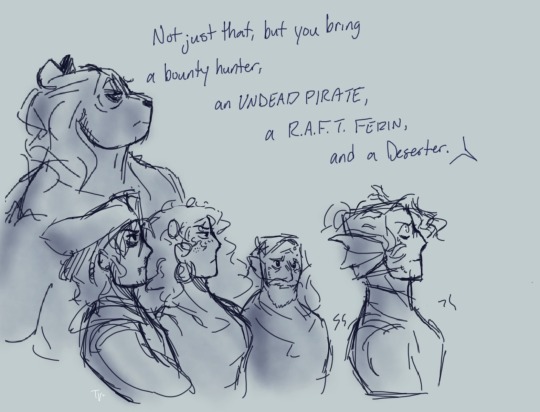
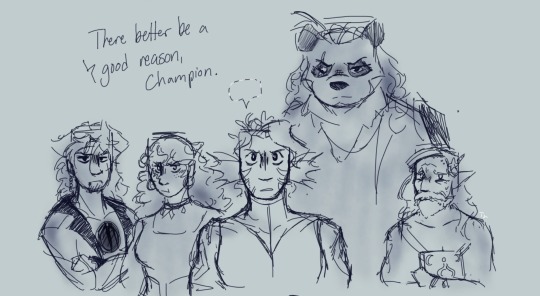
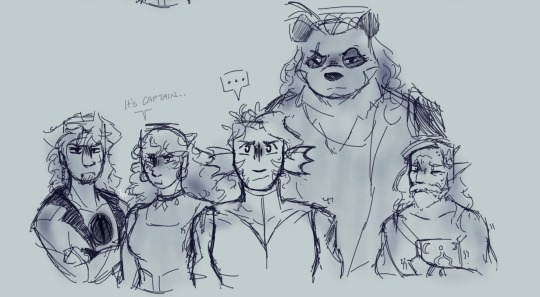


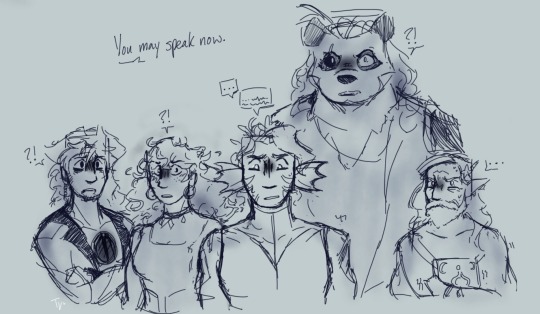
#jrwi riptide#just roll with it#just roll with it riptide#gillion tidestrider#gillion jrwi#jrwi spoilers#jrwi riptide spoilers#this is so messy forgive me#I would say I’ll clean it up but#no I won’t#ooooooo I want an undersea arc so baddddddd#whether or not there’s a whole war or a takeover has already happened#I wanna go under da watah#I wanna see the elders BURNNNN#I know that the dunjon arc happened but I feel like some personal hellscape growth would be challenged by seeing them face to face#anyway#catch me crying in the club over gill#at all times always#tv’s art
861 notes
·
View notes
Text
How to get over negative experiences in your life.



Whether it’s heartbreak, failure, feeling unloved, left out, not achieving something,
Always learn the lesson, then get over it. Life is short, you should not be dwelling on something that has happened!! Don’t let a small part of your day ruin the entire experience of this wonderful life!
It’s like for example: if you had $86400 and someone took away $60, would you be mad? Of course, but would too just give away the remaining $86340 to them? No, that would be stupid. The same way- you have 86400 seconds in a day and something happens, do you just let that consume you the rest of the day? Absolutely not.
That’s why here, we’re all about growing and evolving as people. We know that God gives us everything for a higher purpose, a reason that’s much bigger for you.
So any situation or event he gives you, LEARN FROM IT. Because why would you let something happen to you for nothing? Figure out the lesson, write about it, make a video about it, journal about it, or spread the message about it so more people can learn. But what’s important is that you understand the lesson God was trying to give you and so that experience doesn’t feel like a waste anymore. Instead, it feels like more of a blessing.
Like you also need to understand that all the advice I have and I right about on my blog, I have learned from personal experiences- and that’s how great those problems can be. Heartbreak and failure is your superpower if you know how to use it in a way to boost yourself.
#agirlwithglam🎀✨#it girl#growth#self growth#it girl energy#self improvement#becoming that girl#self love#girlboss#self development#girlblog#girlblogging#self validation#advice#lessons#life lessons#self care#thewizardliz#socialising challenge#healthy
350 notes
·
View notes
Text
The Charisma Myth: things that I liked
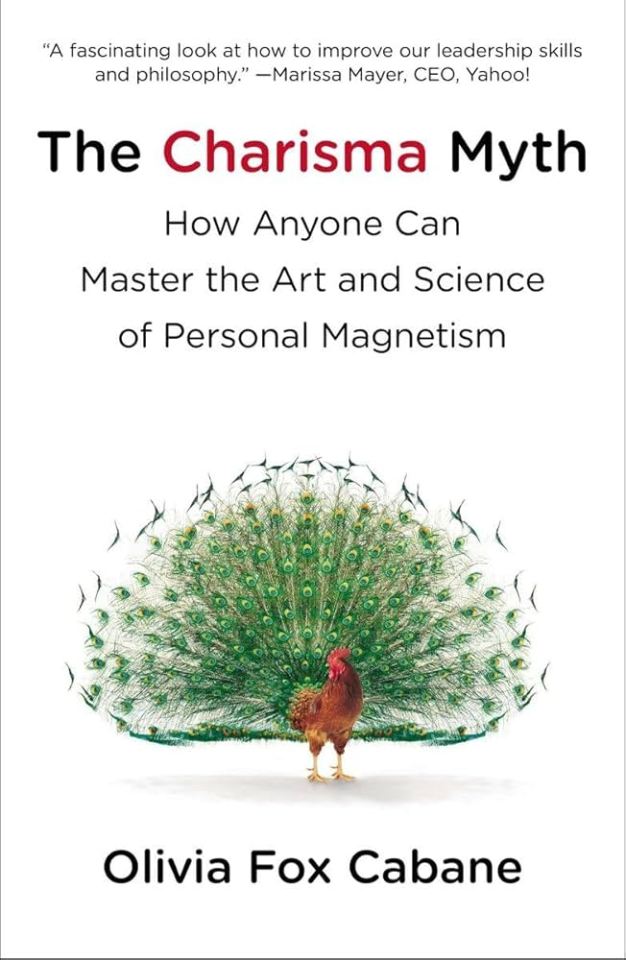
Three quick tips to gain an instant charisma boost in conversation:
Lower the intonation of your voice at the end of your sentences. Reduce how quickly and how often you nod.
Pause for two full seconds before you speak.
The very next time you’re in a conversation, try to regularly check whether your mind is fully engaged or whether it is wandering elsewhere (including preparing your next sentence).
Expensive clothing leads us to assume wealth, friendly body language leads us to assume good intentions, a confident posture leads us to assume the person has something to be confident about. In essence, people will tend to accept whatever you project.
when you can project both power and warmth together, you really maximize your personal charisma potential.
charismatic behaviors must originate in your mind. Knowing how to skillfully handle mental discomfort is even more important than knowing how to handle physical discomfort. Anxiety is a serious drawback to charisma. First, it impacts our internal state: quite obviously, it’s hard to be fully present while you’re feeling anxious. Anxiety can also lower our confidence. Anxiety, low presence, and low confidence can show up directly in our body language, as well as reduce our ability to emanate warmth.
The single most effective technique I’ve found to alleviate the discomfort of uncertainty is the responsibility transfer. Pick an entity—God, Fate, the Universe, whatever may best suit your beliefs—that you could imagine as benevolent. Imagine lifting the weight of everything you’re concerned about—this meeting, this interaction, this day—off your shoulders and placing it on the shoulders of whichever entity you’ve chosen. They’re in charge now. Visually lift everything off your shoulders and feel the difference as you are now no longer responsible for the outcome of any of these things. Everything is taken care of. You can sit back, relax, and enjoy whatever good you can find along the way.
Golfer Jack Nicklaus said that he never hit a shot, even during practice, without visualizing it first. For decades, professional athletes have considered visualization an essential tool, often spending hours visualizing their victory, telling their mind just what they want their body to achieve.
“There is good evidence that imagining oneself performing an activity activates parts of the brain that are used in actually performing the activity,” Professor Stephen Kosslyn, director of Stanford’s Center for Advanced Study in the Behavioral Sciences, wrote me. Visualization can even physically alter the brain structure: repeated experiments have shown that simply imagining yourself playing the piano with sufficient repetition leads to a detectable and measurable change in the motor cortex of the brain.
Silvia recently confided that visualization is one of the secrets to her success. Before key meetings, she’ll imagine “the smiles on their faces because they liked me and they are confident about the value I’m bringing them. I’ll imagine as much detail as I can, even seeing the wrinkles around their eyes as they’re smiling.” She visualizes the whole interaction, all the way through to the firm handshakes that close the meeting, sealing the deal.
A twenty-second hug is enough to send oxytocin coursing through your veins, and that you can achieve the same effect just by imagining the hug. So the next time you’re feeling anxious, you might want to imagine being wrapped up in a great big hug from someone you care about.
Self-confidence is our belief in our ability to do or to learn how to do something.
Self-esteem is how much we approve of or value ourselves. It’s often a comparison-based evaluation (whether measured against other people or against our own internal standards for approval).
Self-compassion is how much warmth we can have for ourselves, especially when we’re going through a difficult experience.
It’s quite possible for people to have high self-confidence but low self-esteem and very low self-compassion.
Types of charisma:
Focus: Focus charisma requires, of course, the ability to focus and be truly present. Good listening skills are nonnegotiable, as is a certain degree of patience. To develop focus charisma, cultivate your ability to be present.
Visionary charisma makes others feel inspired; it makes us believe. It can be remarkably effective even though it won’t necessarily make people like you. We assess visionary charisma primarily through demeanor, which includes body language and behavior. Due to the fact that people tend to accept whatever you project, if you seem inspired, they will assume you have something to be inspired about.
kindness charisma comes entirely from body language—specifically your face, and even more specifically your eyes. Kindness charisma is primarily based on warmth. It connects with people’s hearts, and makes them feel welcomed, cherished, embraced, and, most of all, completely accepted.
Authority charisma is primarily based on a perception of power: the belief that this person has the power to affect our world. We evaluate someone’s authority charisma through four indicators: body language, appearance, title, and the reactions of others. you’ll need to learn how to “take up space” with your posture, reduce nonverbal reassurances (such as excessive nodding), and avoid fidgeting. You may need to speak less, to speak more slowly, to know how and when to pause your sentences, or how to modulate your intonation. Look expensive.
Avoid holding a drink in your right hand, especially if it’s a cold drink, as the condensation will make your hand feel cold and clammy. Before shaking someone’s hand, whether you are a man or a woman, rise if you’re seated. And keep your hands out of your pockets: visible hands make you look more open and honest. Make sure to use plenty of eye contact, and smile warmly but briefly: too much smiling could make you appear overeager. Keep your head straight, without tilting it in any way, and face the person.
Ask people open ended questions, focus on questions that will likely elicit positive emotions. With your questions, you have the power to lead the conversation in the direction you want. In fact, even when you’re speaking, the one word that should pop up most often in your conversation is not I but you. Instead of saying “I read a great article on that subject in the New York Times,” try “You might enjoy the recent New York Times article on the subject.” Or simply insert “You know...” before any sentence to make them instantly perk up and pay attention.
Another way to exit a conversation with grace is to offer something of value:
Information: an article, book, or Web site you think might be of use to them A connection: someone they ought to meet whom you know and can introduce them to
Visibility: an organization you belong to, where you could invite them to speak
Recognition: an award you think they should be nominated for
When someone has spoken, see if you can let your facial expression react first, showing that you’re absorbing what they’ve just said and giving their brilliant statement the consideration it deserves. Only then, after about two seconds, do you answer. The sequence goes like this:
They finish their sentence
Your face absorbs
Your face reacts
Then, and only then, you answer
The next time you’re given a compliment, the following steps will help you skillfully handle the moment:
1. Stop.
2. Absorb the compliment.
3. Let that second of absorption show on your face. Show the person that they’ve had an impact.
4. Thank them. Saying “Thank you very much” is enough, but you can take it a step further by thanking them for their thoughtfulness or telling them that they’ve made your day.
It’s not just metaphors that can paint the wrong picture. Some common phrases can have the same effect. When you tell someone, “No problem,” “Don’t worry,” or “Don’t hesitate to call,” for example, there’s a chance their brain will remember “problem,” “worry,” or “hesitate” instead of your desire to support them. To counter this negative effect, use phrases like “We’ll take care of it” or “Please feel free to call anytime.”
You can deliver value to others in multiple ways:
Entertainment: Make your e-mail or meeting enjoyable.
Information: Give interesting or informative content that they can use.
Good feelings: Find ways to make them feel important or good about themselves.
The longer you speak, the higher the price you’re making them pay, so the higher the value ought to be.
If your goal is to communicate power, set the pitch, tone, volume, and tempo of your voice in the following ways:
Pitch and tone: The lower, more resonant, and more baritone your voice, the more impact it will have.
Volume: One of the first things an actor learns to do on stage is to project his voice, which means gaining the ability to modulate its volume and aim it in such a targeted way that specific portions of the audience can hear it, even from afar. One classic exercise to hone your projection skills is to imagine that your words are arrows. As you speak, aim them at different groups of listeners.
Tempo: A slow, measured tempo with frequent pauses conveys confidence.
To emanate vocal warmth, you need to do only one thing: smile, or even just imagine smiling.
Charismatic people are known to be more “contagious”; they have a strong ability to transmit their emotions to others.
The most effective and credible compliments are those that are both personal and specific. For instance, instead of “Great job,” you could say, “You did a great job,” or, better yet, “The way you kept your calm when that client became obnoxious was impressive.”
Here’s one specific—and surprisingly effective—recommendation for phone charisma, courtesy of author Leil Lowndes: Do not answer the phone in a warm or friendly manner. Instead, answer crisply and professionally. Then, only after you hear who is calling, let warmth or even enthusiasm pour forth in your voice. This simple technique is an easy and effective way to make people feel special. I recommend it to all my business clients whose companies have a strong customer service component. The gains in customer satisfaction are impressive.
Charisma takes practice. Steve Jobs, who appeared so masterful on stage, was known to rehearse important presentations relentlessly.
Retain at least a certain measure of equanimity. Most charismatic leaders are known for their ability to remain (or appear) calm even in the midst of turbulent circumstances.
#Book review#charisma#challenge#c suite#powerful woman#ceo aesthetic#productivity#that girl#balance#getting your life together#personal growth#strong women
344 notes
·
View notes
Text
I was reading through General Lilia’s card lines (woo he came home!!) and this one line really struck me because I think it contrasts well with a future dialogue he has with Malleus.

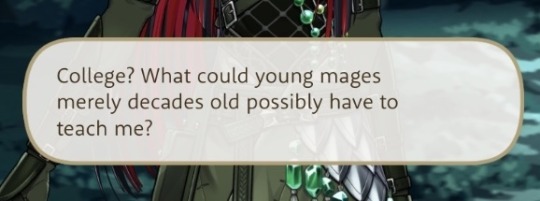
In his general days, Lilia completely dismisses the worth of NRC, because he believes with his skills and knowledge he’s already learned everything he needs to. He has a sort of arrogant approach, believing young mages or people in general couldn’t possibly have anything to teach someone like him.
In contrast, current day Lilia acts with humility and has an opposite view, which he discusses with Malleus. He loves travelling and meeting new people, and is always open to new experiences and learning new things. Lilia understands that there are certain valuable things that Malleus can never learn through books or tutors, that can only be found through connecting with people and learning to understand experiences that are different from your own.
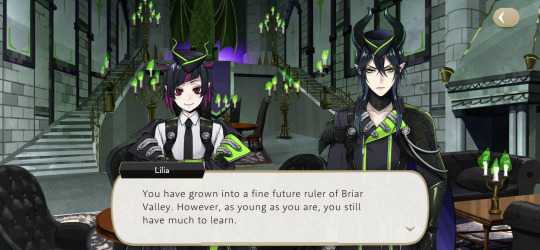
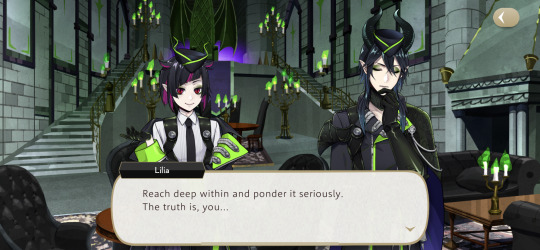
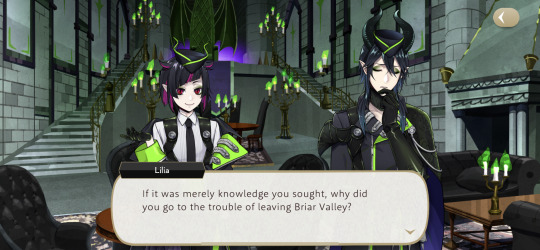
We can see how Lilia has matured and become more open minded, because he’s able to challenge Malleus’ worldview that, despite being in a similar situation to Lilia and already having nothing to learn academically at NRC, there’s so much Malleus can learn just from having experiences with other people. Social skills, tolerance, kindness, friendship, humility, and maturity are all areas he can improve on from interacting with those different to him.
(To clarify, Malleus isn’t so much dismissing the value of these things, he’s just acting aloof because he was left out once again. So Lilia has to remind him why it’s worth it for him to have come, because he knows Malleus is searching for ‘something more’ in his life than just the knowledge/power/skills he already has).
TLDR; General Lilia parallels with current Malleus, and modern Lilia tries to help Malleus learn from his faults because he had the same attitude 😭💔
#lilia’s growth 🥹🥹#i love how lilia can speak frankly (but kindly) with malleus to actually challenge him and get him to grow#malleus draconia#lilia vanrouge#twst book 7#twst#twisted wonderland
427 notes
·
View notes
Text
things to do while on a dopamine detox⋆.ೃ࿔*:・🍰

start reading a new book, or better yet, start a small book club with a couple of ur friends so that then u all can read together and discuss


get a flip phone for ur dopamine detox period and decorate it with cute charms and glitter
study something outside of school (go to the library and read up on whatever ur interested in, become an expert at it)
go out (go to the mall and go shopping, go to a party or a get together)
get a pen pal and write letters to each other back and forth (get fancy and buy cute paper and glitter pens, add pressed flowers and cute gifts to each letter)
get into scrap-booking
PICKING UP A NEW PROJECT ;
sewing an article of clothing and designing a piece thats uniquely yours
planting a small garden of ur favorite flowers


analyzing and annotating a piece of literature
dabble in poetry or book writing
start a club
THINGS TO STUDY OUTSIDE OF SCHOOL ;
your own culture and language
barbie doll fashion
advance of science and maths in islamic kingdoms
learn about matriarchal societies
forensic investigation methods (if ur into that ig)
#dopamine detox challenge👡🎀#it girl#becoming that girl#self care#self love#it girl energy#that girl#honeytonedhottie⭐️#projects#self improvement#self development#self growth#for funsies#girl blogging#girl blogger#dream girl tips#dream girl#dream life#hyper femininity#princess#doll#mental well being#well being
847 notes
·
View notes
Text
HOW TO INCREASE SELF AWARENESS?
1. pay attention to what bothers you about others.
2. pay attention to which negative emotion you dislike and avoid the most.
3. identify unhelpful thoughts and beliefs you have.
4. make time to clarify your values.
5. draw a timeline of your life.
6. send out feedback about yourself.
7. practice mindfulness meditation
#self improvement#mental health#self confidence#productivity#self help#personal growth#it girl#student#study blog#self healing#chaotic academia#positivity#studyblr#studyspo#self love#university#glow up#healing#dark academia#100 days challenge#txt#self esteem#self worth#self awareness#self aware
274 notes
·
View notes
Text
Moon 63 - Week 1, Part 2
New Company
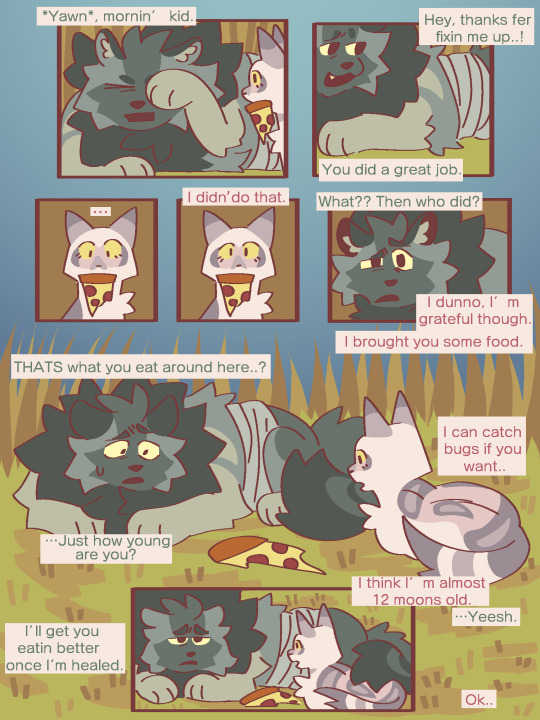
You’re small for your age, kid…
#askblog#clangen#clangen challenge#warrior cats#THE TIMESKIP MESSED UP MY PERCEPTION OF TIME#BC LIKE YEAH OK WOW… WE WENT FROM MOON 60 TO NOW WE’RE AT 66#so she’s a year old…. still baby tho#she’s literally been alone since she was 4 months old 😭#girl has been surviving off of trash and bugs#growth is a little stunted </3#Crest#Coyotekit#Spike#(Implied)
685 notes
·
View notes
Text
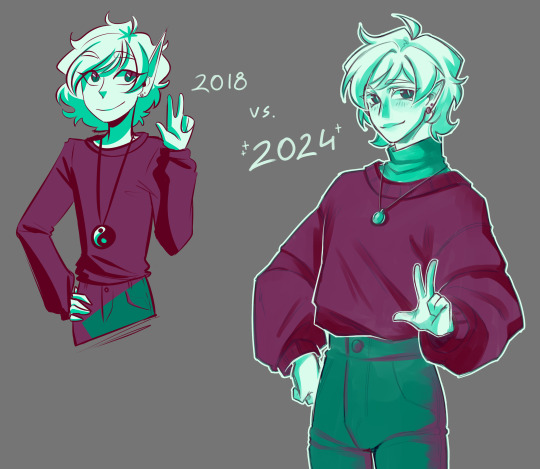
a redraw of this old post that jumpscared me a while back LMAO
#look at my baby boy and how much he changed#from basic ass elf to magical alien refugee#love to see the growth#digital art#digital#oc#original character#original characters#ocs#original project#original projects#ethteria#redraw#color palette#color palete challenge
104 notes
·
View notes
Text
You know, in my opinion, being ridiculous is sometimes even a good thing, and better that; we can forgive one another more quickly, and acquire humility more quickly; after all, we can't understand everything at once, we can't begin directly from perfection! In order to achieve perfection, we must first of all fail to understand a great many things! And if we understand too quickly, we may not understand very well.
— Fyodor Dostoevsky, The Idiot
#dark academia#dark academia aesthetic#books and literature#literature#books#literature quotes#bookstagram#book quotes#life quotes#currently reading#bookblr#book blog#booksbooksbooks#classic literature#modern literature#english literature#literary quotes#russian literature#philosophy#psychology#self growth#self awareness#reading challenge#read a book#books and reading#reading#light acadamia aesthetic#book quote#quotes#ocean vuong
61 notes
·
View notes
Text
Keith felt bruises behind his eyes as he stared up at the hologram. No matter how many times he ran the battle simulation, BOOM. He watched for the 100th time as the planet that Voltron was simulated to defend exploded in fiery death-ray style.
The black paladin rubbed at his face and sighed.
“End simulation.”
Keith whipped around at the surprise voice, spotting Lance entering the dimly lit room, blue holographic light shining across his freckled skin.
“What was that for?” Keith huffed. He knew he wasn’t fooling Lance with the whole “respect your leader” act, that his voice was too weary.
“You’re going to kill yourself over this stupid sim,” Lance told him, forcing a warm cup into Keith’s hands. He turned toward the blue light, reaching a hand up and gently over the planet debris, still frozen in time. With a flick of his wrist, Lance dispelled the image.
“I just can’t figure out what’s wrong with our formations,” Keith started as the light changed to a glowing yellow. He took a sip of the cup. It was warm and sweet, not quite tea, but likely one of Hunk’s comforting creations. Still, it couldn’t settle the writhing mess in his ribs.
“Why don’t you let Allura or Pidge help? Or… me?” Lance asked. “I’m your right hand guy for a reason.” Keith dismissively waved a hand through the air, ignoring Lance’s look of offense.
“I have to do this on my own, Lance,” he told him sharply. “I’m the black paladin. Shiro did this a million times. Sure, sometimes with Allura, but he also did it alone.” Keith’s hands hovered over the buttons, but Lance stepped in front of them, forcing Keith to take a step back.
“Hey. You don’t have anything to prove here,” Lance said, tone full of caution. “You’re not Shiro, Keith, you can have a different strategy. Just because he isn’t here doesn’t mean you have to fill any hole he left behind.” Keith felt something burn inside him and he clenched his fists.
“I’m not trying to be Shiro, okay? I know I won’t live up to that.”
“That’s not what I meant, and you know—“
“I just have to do this without distractions. I’m the fucking leader, now. You just have to trust my decisions here.” Keith looked Lance in the eye with a challenge. He knew he was too tired for this, but he didn’t back down even as Lance straightened to his full height and jabbed a finger at him.
“Fuck you,” Lance hissed. “I’m your second. I get to challenge you, talk shit through with you, and tell you when I think you’re acting like an ass. Breaking news, Keith! This is peak asshole behavior.” Keith rolled his eyes.
“You aren’t needed here, Lance, and if you can’t let go of your insecurity for the sake of the team and let me figure this out, then this will be on you.” He gestured to the empty air where the battle sim had been, anger clouding his words.
Lance paused. He took a step back, his legs hitting the console table.
“You’re right, you’re not like Shiro,” he responded, voice cold, eyes sparking with something hidden. “Shiro wouldn’t dismiss me like this, especially if he knew I was right.” With that, he shoved past Keith and stormed back out of the room.
“Computer off.”
Bright yellow light faded to a dim, barely lit red, as if to taunt him.
#im so in my rpbp klance era#i love u rp!lance#i love u bp!keith#emotional growth thru challenges to ur personality and way of life??? girl dinner.#voltron#lance mcclain#keith kogane#klance#vld#lance voltron#klance fic#klance fanfiction#keith vld#fanfiction#rp / bp dynamics
108 notes
·
View notes
Text
For context, this a follow up to @crustyfloor’s great addition to my post about wanting Ivan to live for Ivan and not just for the sake of IvanTill.
My response just got so long, I thought it’d be better to make it a separate post so here we are!
“‘I wish Ivan lived for Till’ His relationships aren't all there is to him.”
THIS. RIGHT. HERE.
There is so much more to Ivan and it pains me that people don't see it or don't care.
And I get it, like @rockwgooglyeyes said there is a fair amount of focus on shipping in fandoms, and relationships are an integral part of the larger narrative of Alien Stage, but there's more to these characters than that.
Ironically enough, even Ivan views himself as nothing more than someone in service of Till. Ivan doesn't think he's much of anything without him.
Having Ivan live and be rescued by the rebels is the perfect opportunity to change all of that.
He would be completely cut off from his previous life (the aliens, Alien Stage, Till, etc.) and forced to reckon with who he is as a person when nothing is demanded of him anymore.
Let him finally drop the mask and get more comfortable showing his true personality.
Let him get his hands dirty with the rebellion, build his self-esteem from the ground up, and grow to live for himself.
Let him reconnect with Mizi! Have him realize that there are people who care about him and would miss him if he was gone. That there can be more to his life than always chasing, endlessly giving, and never receiving.
I would LOVE to see him have an arc of character development like Mizi. I’d pay for it, even.
This is probably controversial for me to say, but one of my main criticisms of Ivan canon-wise is that he doesn't grow much as a character, if at all.
From the beginning to where we are now, Ivan has always been laser focused on Till. Everything we learn about Ivan is tied to Till in some way. Even in the comics or art we get involving him, they almost always include Till.
I was joking before with my tags about Ivan not thinking about anything other than Till. But what do we know about Ivan that doesn't have anything to do with Till?
We learned that he's the only character that wasn't bred and lived his early years on the streets as a stray, but nothing beyond that???
Like that's such an interesting story idea to include and we know next to nothing about it!
And then Ivan sacrifices himself for Till. Something he would've done at any point in the story.
Nothing changed. His arc is flat. His character is static.
(And to be honest I kind of feel like this was done just as a means to further Till's character development—*runs away*)
There's still a chance to show people who Ivan is.
Not Ivan Unsha. Not "Till's lover boy".
Ivan.
I hope we get to see him.
Shoutout to everyone in the notes of the original post, your takes are all incredibly based! @unshallow-feelings @nottoonedin @paradisedisconcert @atrophiedemotion @m1zisua @hoisinblackcat
#long post#sorry i just had a lot of thoughts#alien stage is such a cool concept and i really enjoy the series#but sometimes i’m just like damn#please give my poor boy some independent character growth and development#i am begging#no hate to vivinos or qmeng of course#alien stage#alnst#alien stage ivan#alnst ivan#ivanttakethis shut up about ivan challenge: impossible#ivanttakethis talks too much
82 notes
·
View notes
Text


day 16/100 ~ 100 days of productivity
notes: ♡ today a few of my teachers were a way, and i'm always slow when i work by myself - so i have a bit of work to catch up on. luckily, tomorrow i don't have many classes so i should be able to do that pretty easily. ♡ work complete: worked on some learning modules to get my learner licence, did some mathematics homework, daily spanish study
habit tracking:
physical activity deep work reading time spanish study
image source: pinterest
#nenelonomh#that girl#becoming that girl#student#productivity#chaotic academia#student life#academia#study blog#100dop#100 dop#studyblr#100 days of productivity#100 days of studying#100 days challenge#100 days of self discipline#100 day project#it girl#it girl aesthetic#it girl energy#dream girl#girlblogging#latte girl#self improvement#learning#growth#pinterest girl#girl blogger#level up#level up journey
76 notes
·
View notes